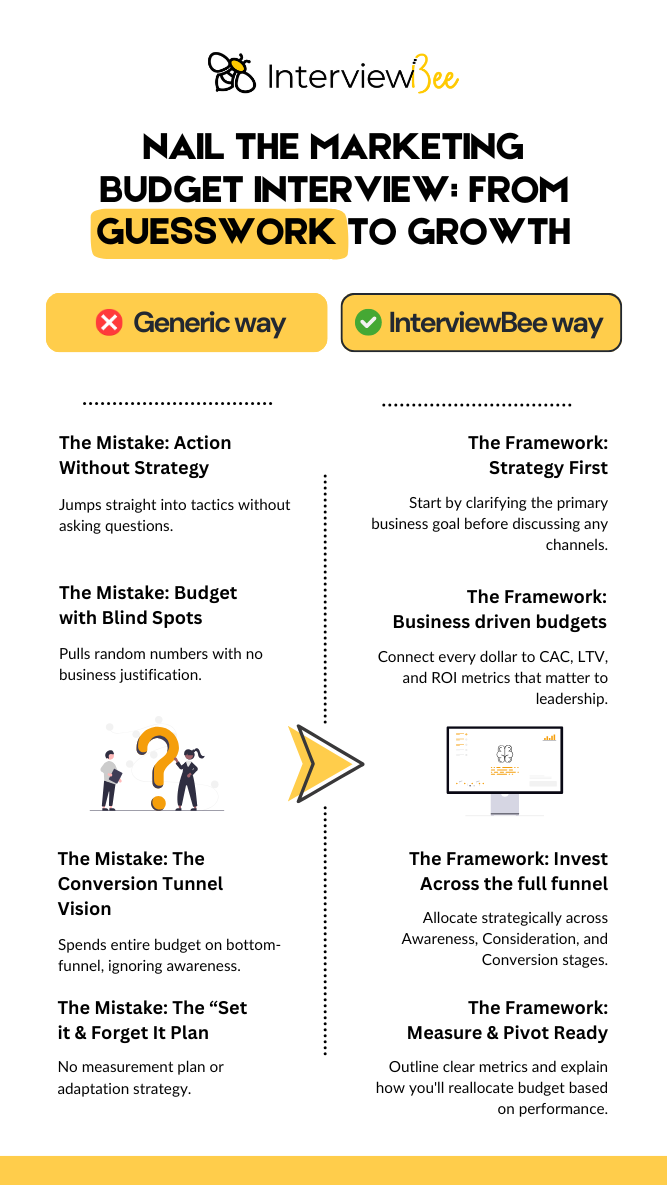
84% of Marketing Managers Failed This Budget Question in 2025: Here's the Framework That Gets Results
- Author: Anindita Ghosh
- Published On: Jun 17, 2025
- Category:Marketing
This is a shocking statistic provided by the hiring data of 2025, GoodTime's 2025 Hiring Insights Report shows that 84 percent of candidates fail on one of the most common marketing manager interview questions. It is not a trick question relating to some esoteric measurement, it is a plain strategic thinking test that distinguishes between the great marketers and all others.
The Career-Wrecking Question
At first sight it appears to be a simple one: "You have a $300K marketing budget to spend in the next quarter to promote a new B2B SaaS product, how would you allocate it and what are your reasoning behind decisions?"
However, the same case has turned out to be a stumbling block in interviews in large companies. The reason most candidates fail isn't due to lack of channel knowledge, but because this question tests strategic business thinking. Interviewers are interested in finding out your way of thinking, and not what you have learnt. It is a typical case of budget allocation interview questions, which are normally used to eliminate the pseudo-strategic leaders.
What Goes Wrong in the First 5 Minutes
- Channel-First, Strategy-Last: Most candidates immediately jump into a list of channels ("I'd put $100k into Google Ads..."). They fail to first define the goals, target audience, or the 'why' behind their choices, which is a critical mistake in marketing manager interview questions.
- No "Why" Behind the Numbers: They assign arbitrary numbers without connecting them to key business objectives like Customer Acquisition Cost (CAC), Lifetime Value (LTV), or specific lead generation targets.
- Forgetting the Funnel: A common pitfall in marketing interview questions 2025 is focusing only on bottom-of-the-funnel conversion tactics while completely ignoring crucial awareness and consideration stages.
- No Plan for Measurement: Many forget to explain how they will measure ROI or what metrics they will track, making their plan seem incomplete and unaccountable
The Reward Framework That Gets Results
- Successful candidates don't have a magic formula, but they do have a structure. The best approach is to break down the problem methodically.
- Purpose (1 minute): First, clarify the primary objective. Ask questions like, "Is the main goal brand awareness, lead generation, or driving immediate sales-qualified leads? What is our target CAC?" This demonstrates strategic thinking, a core requirement for challenging marketing manager interview questions.
- Plan (2 minutes): Outline a high-level allocation across the marketing funnel. For a B2B SaaS launch with a $300K quarterly budget, a balanced approach could be:
- Awareness (20% - $60k): Content Marketing (blogs, guides), LinkedIn Ads to reach the target ICP.
- Consideration (40% - $120k): Google Ads for high-intent keywords, sponsoring webinars, promoting gated assets like whitepapers
- Conversion (30% - $90k): Retargeting campaigns, case study creation, and sales enablement materials.
- Measurement & Analytics (10% - $30k): Budget for analytics tools, reporting, and an experimental buffer. This thoughtful approach is what interviewers look for in budget allocation interview questions.
- Proof & Pivot (3 minutes): Explain how you'll measure success with stage-specific metrics
- Awareness Stage: Brand lift surveys, reach and impressions, website traffic growth, and cost per thousand impressions (CPM).
- Consideration Stage: Cost Per Lead (CPL), content engagement rates, webinar attendance, whitepaper downloads, and lead quality scores
- Conversion Stage: MQL-to-SQL conversion rate, cost per SQL, pipeline value generated, and sales cycle length
- Overall Performance: Customer Acquisition Cost (CAC), Return on Ad Spend (ROAS), and LTV:CAC ratio
Crucially, state that this budget is a starting point for Q1. You would analyze performance after 30-45 days and reallocate funds from underperforming to overperforming channels for the remainder of the quarter, with learnings informing Q2 budget allocation. This adaptability is vital for modern marketing interview questions 2025.

How InterviewBee Helps You Nail Your Framework
Knowing this framework is one thing; executing it under pressure is another. When you freeze, InterviewBee becomes your strategic marketing coach with real-time, role-specific guidance.
- Instant Marketing Framework: The moment you hear "How would you allocate a $500K budget?", InterviewBee immediately provides the proven structure: "Start by clarifying: Is this for lead generation, brand awareness, or customer retention?" It then prompts specific follow-ups like "Ask about their current CAC by channel" or "Inquire about attribution model preferences."
- Industry-Specific Budget Intelligence: Unlike generic interview tools, InterviewBee understands marketing nuances. When you mention SaaS, it suggests: "Allocate 60% to demand generation, 25% to product marketing, 10% to brand, 5% to testing." For e-commerce, it adapts: "Prioritize 70% performance marketing, 20% creative production, 10% retention campaigns."
- Real-Time ROI Calculations: When discussing budget allocation, InterviewBee provides specific metrics: "Mention your expected 3:1 ROAS for paid search, 5:1 for email marketing, and 2:1 for brand campaigns in year one." This level of granular thinking separates strategic marketers from tactical executors.
- Advanced Attribution Insights: InterviewBee ensures you address measurement complexity, prompting you to mention: "I'd reserve 5% for attribution tools like Triple Whale or Northbeam, given the iOS changes affecting Facebook attribution." This shows you understand modern marketing challenges beyond basic channel management.
This budget question isn't going away. It's a fundamental test of strategic marketing thinking. According to Improvado's 2025 Marketing Budget Allocation research, companies increasingly prioritize data-driven budget decisions and multi-touch attribution capabilities.
With a proven framework and marketing-specific real-time support, you can demonstrate you're among the strategic 27% who don't just execute campaigns, but architect revenue growth systems.
Ready to ace your next marketing interview? Try InterviewBee for free for free and turn tough questions into job offers.


